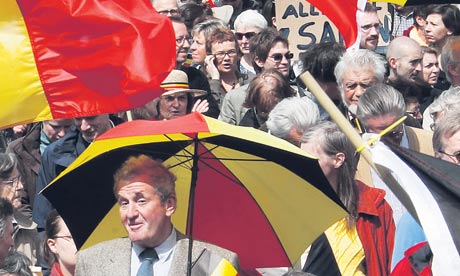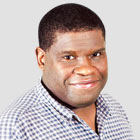Each nation's attachment to its language puts it on the frontline of national and international disputes

Less than half an hour's train ride from the multilingual hub of Brussels, Eddie de Block, the trilingual (French, Flemish and English) mayor of Merchtem, defends the right to run a monolingual town. In a municipality with only 3% French-speakers he passed a law, a few years ago, that everybody must not only learn Flemish, a Dutch dialect, in school, but that even in the playground Flemish only should be spoken.
At his behest, the council also passed a law – later struck down for infringing freedom of speech – that all signs in the town's weekly market must be in Flemish, after a meat-seller displayed a sign in Arabic. "People have to speak Dutch," De Block says. "I think that we must defend the Flemish culture. It's really necessary because the other influences are very strong."
Belgium was once again riven today in the battle between French and Flemish speakers after the Flemish nationalist party, The New Flemish Alliance – pledging to work towards independence for Flanders – won a shock victory in the Belgian elections to become the largest political party.
Language would seem like an unlikely candidate for such an intense power struggle. "Most people never think about their language at all, and never attach any emotional significance to it," argues Paul Brass in his book Elite Competition and Nation Formation. Yet it is precisely this unconscious attachment that has put it on the frontline of national and international disputes and at the heart of many political identities.
What we speak and why is no accident, but rather a product of power struggles for economic, political and cultural supremacy or resistance. The Soweto uprising in South Africa was sparked by the insistence of the apartheid regime that Afrikaans – the language of the Boer white minority – had to be used for mathematics, arithmetic and social studies in black schools from 7th grade. Desmond Tutu branded Afrikaans the "language of the oppressor".
During the second world war, German-Americans were arrested in the US for speaking German. Before the arrival of Christopher Columbus, more than 300 languages were spoken in North America; now there are around only 175, of which 90% are effectively moribund. Today, more than half the world lives in a place where their mother tongue and the official language are not the same. Belgium's linguistic divide mirrors a reversal of economic fortunes whereby the once wealthy, industrial French-speaking Walloonia has now been eclipsed by a far more productive, hi-tech Flanders.
Language, then, all too often becomes the most intimate proxy for broader societal conflicts that have little to do with what people actually speak. "National languages are . . . almost always semi-artificial constructs and occasionally . . . virtually invented," writes Eric Hobsbawm in Nations and Nationalism. "They are the opposite of what nationalist mythology supposes them to be, namely the primordial foundations of national culture and the matrices of the national mind. They are usually attempts to devise a standardised idiom out of a multiplicity of actually spoken idioms, which are thereafter downgraded to dialects."
The best example of this is Hebrew, which by the end of the 18th century was reduced to a classical language – a religious tongue reserved for liturgies and the synagogue – but almost never spoken socially. Reviving it from a written language to a spoken one was regarded as crucial to the Zionist project that created the state of Israel. It was a mother tongue that children taught their mothers.
Historically, there is a particularly loose attachment between modern nations and their so-called national languages. The notion that a British monarch would speak English as their native tongue – if indeed at all – is a relatively recent one, and the barons responsible for the Magna Carta, who are today hailed as the among the first patriots, did not speak English. Hobsbawm estimates that only 2.5% of Italians spoke the national language at the time of unification. "We have made Italy. Now we must make Italians," said Massimo d'Azeglio at the first meeting of the newly united Italy's infant parliament in 1861.
At the time of the French revolution, half of France didn't speak French and only 12-13% spoke it correctly; while for Spain the issue is still far from resolved. The official language is Castilian, but roughly a quarter of the country also speaks one of the three main co-official regional languages – Catalan, Basque or Galician. In the Basque country, defence of the local language has been central to a nationalist agenda that has at times become violent. In 2008, the authorities on the Balearic island of Majorca, a popular tourist destination, planned to set up a "language police" to impose the local Catalan language in restaurants.
"The 19th century in Europe marked a historical turning point in the construction of modern nationalism," write Tony Judt and Denis Lacorne in their introduction to The Politics of Language. "No one any longer said 'the nation exists because it has a language', but rather 'the nation exists, therefore it must be given a language'."
All the more ironic, then, that in the 21st century there would be such a push to tie language to citizenship and inclusion, particularly throughout Europe. According to a Harris poll in 2007, 86% of Germans, 83% of Britons, 61% of French and Italians and 50% of Spaniards believe that citizenship and language tests are necessary for new immigrants. Quite which Spanish language immigrants in Spain are supposed to speak is not entirely clear. Nonetheless, half the country wants them to speak it.


No hay comentarios:
Publicar un comentario
Censuras: